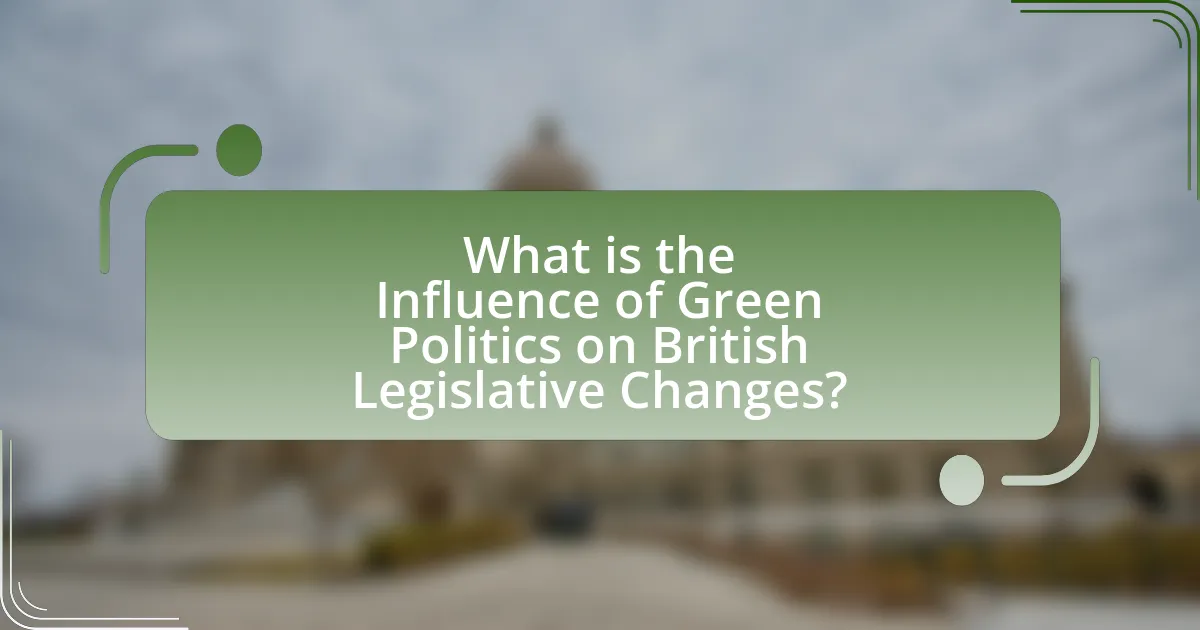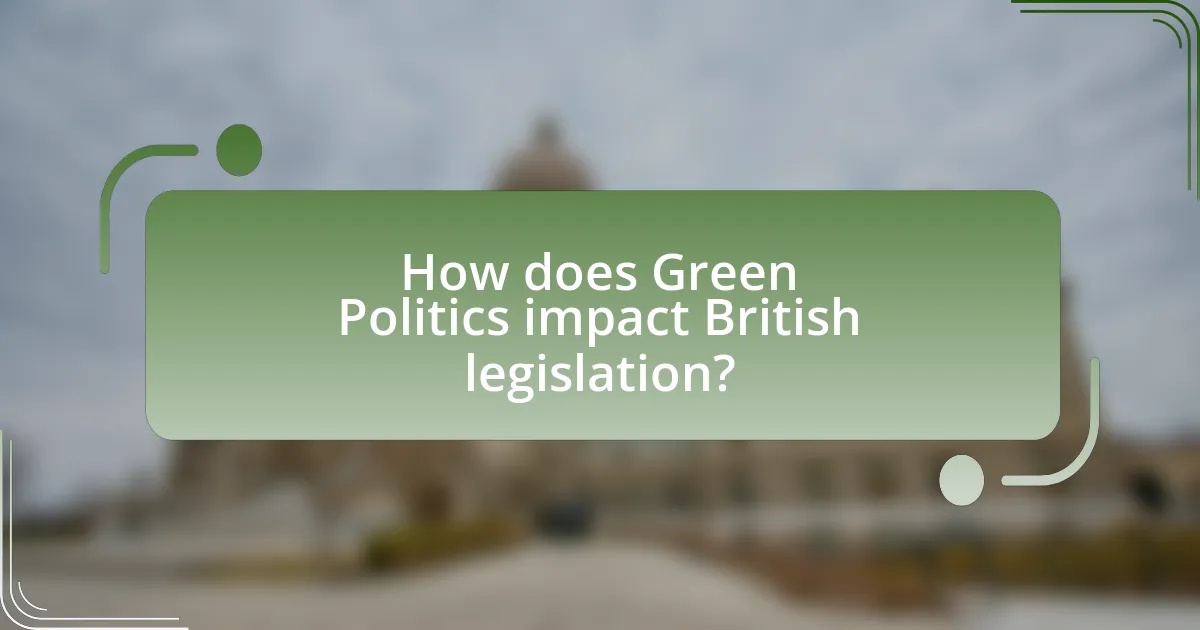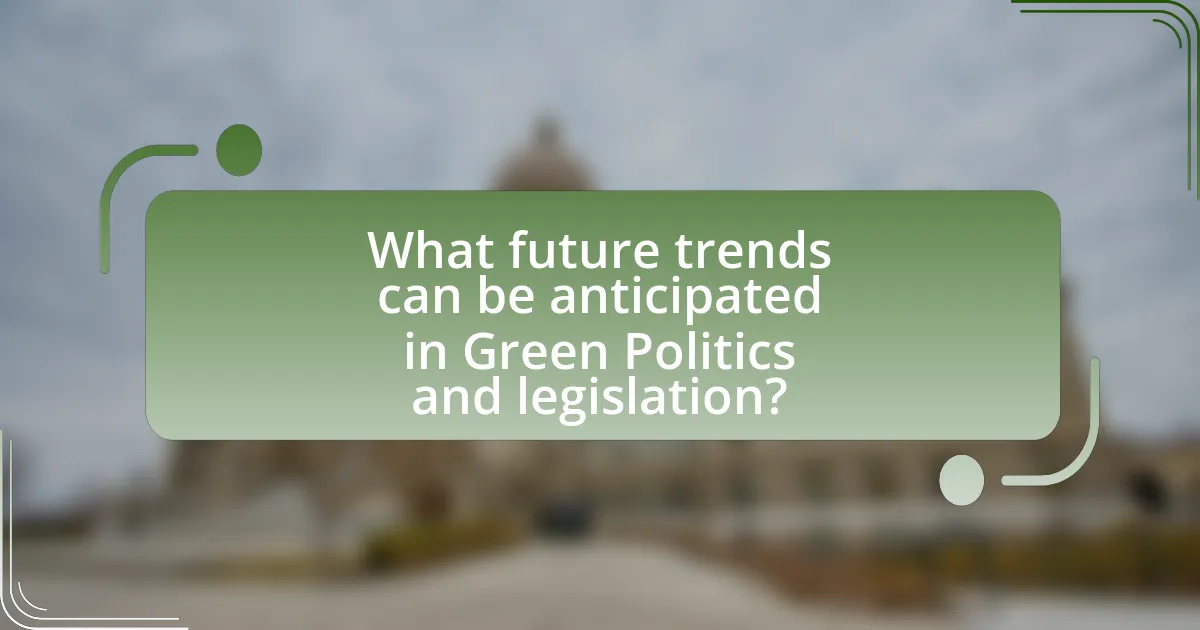The article examines the significant influence of Green Politics on legislative changes in the UK, highlighting how environmental sustainability has become a priority in policy-making. It discusses the evolution of Green Politics from a fringe movement to a mainstream political force, marked by key events such as the establishment of the Green Party and the introduction of landmark legislation like the Climate Change Act of 2008. The article also explores public perceptions of Green Politics, the core principles that define it, and the role of political parties in promoting green initiatives. Additionally, it addresses recent legislative changes, challenges faced in the legislative process, and future trends in Green Politics, emphasizing the importance of grassroots movements and technological advancements in shaping environmental policy.

What is the Influence of Green Politics on British Legislative Changes?
Green politics significantly influences British legislative changes by prioritizing environmental sustainability in policy-making. This influence is evident in the introduction of laws such as the Climate Change Act of 2008, which established legally binding carbon reduction targets, reflecting the growing importance of environmental issues in the political agenda. Additionally, the rise of the Green Party and increased public awareness of climate change have pressured mainstream political parties to adopt greener policies, leading to initiatives like the 25 Year Environment Plan and commitments to net-zero emissions by 2050. These legislative changes demonstrate the tangible impact of green politics on shaping the UK’s environmental framework and policy direction.
How has Green Politics evolved in the UK?
Green Politics in the UK has evolved significantly since the late 20th century, transitioning from a fringe movement to a mainstream political force. Initially, the UK Green Party was founded in 1973, advocating for environmental issues and social justice, but it gained limited electoral success until the 1990s. The 1997 general election marked a turning point, as environmental concerns became more prominent in political discourse, leading to the establishment of the Department of Environment, Transport and the Regions.
By the 2000s, Green Politics influenced major parties, prompting the Labour Party to adopt more environmentally friendly policies, such as the Climate Change Act of 2008, which set legally binding carbon reduction targets. The 2010 general election saw the Green Party win its first parliamentary seat, further solidifying its role in UK politics.
In recent years, the urgency of climate change has propelled Green Politics into the spotlight, with movements like Extinction Rebellion and the youth-led Fridays for Future campaign amplifying calls for action. The 2019 general election resulted in the Green Party achieving its highest vote share, reflecting a growing public concern for environmental issues.
Overall, Green Politics in the UK has evolved from a marginal movement to a significant influence on legislative changes, shaping policies aimed at addressing climate change and promoting sustainability.
What historical events shaped the emergence of Green Politics in Britain?
The emergence of Green Politics in Britain was significantly shaped by the 1960s environmental movement, particularly the publication of Rachel Carson’s “Silent Spring” in 1962, which raised awareness about pesticide use and its ecological impacts. This period also saw the establishment of the first environmental organizations, such as Friends of the Earth in 1969, which mobilized public concern over environmental degradation. Additionally, the 1972 United Nations Conference on the Human Environment in Stockholm marked a pivotal moment, as it brought global attention to environmental issues and influenced British policy. The 1980s further solidified Green Politics with the formation of the Green Party in 1985, which aimed to address ecological concerns within the political framework. These events collectively laid the groundwork for the integration of environmental issues into British legislative changes, leading to significant policies such as the Environmental Protection Act of 1990.
How have public perceptions of Green Politics changed over time?
Public perceptions of Green Politics have evolved significantly from initial skepticism to broader acceptance and integration into mainstream political discourse. In the 1970s and 1980s, Green Politics was often viewed as fringe or radical, primarily associated with environmental activism and protests against industrial practices. However, as awareness of climate change and environmental degradation grew, particularly in the 1990s and 2000s, public concern shifted, leading to increased support for green policies and parties.
This change is evidenced by the rise of the Green Party in the UK, which gained substantial electoral support, particularly in the 2010s, reflecting a growing recognition of environmental issues among the electorate. Surveys indicate that by 2020, a significant majority of the British public prioritized climate action, with 67% of respondents in a YouGov poll expressing concern about climate change. This shift illustrates a transformation in public perception, where Green Politics is now seen as essential for sustainable development and legislative change, influencing policies across various sectors.
What are the key principles of Green Politics?
The key principles of Green Politics include ecological sustainability, social justice, grassroots democracy, and non-violence. Ecological sustainability emphasizes the need to protect the environment and promote renewable resources to ensure a healthy planet for future generations. Social justice advocates for equitable distribution of resources and opportunities, addressing issues such as poverty and inequality. Grassroots democracy focuses on empowering local communities to participate in decision-making processes, ensuring that all voices are heard. Non-violence promotes peaceful methods of conflict resolution and social change. These principles collectively aim to create a more sustainable and just society, influencing legislative changes in various countries, including the UK, where Green Politics has shaped policies on climate change and environmental protection.
What core values define Green Politics in the UK context?
The core values that define Green Politics in the UK context include environmental sustainability, social justice, grassroots democracy, and ecological wisdom. Environmental sustainability emphasizes the need to protect natural resources and ecosystems for future generations, which is reflected in policies aimed at reducing carbon emissions and promoting renewable energy. Social justice advocates for equitable distribution of resources and opportunities, ensuring that marginalized communities are not disproportionately affected by environmental degradation. Grassroots democracy encourages participatory decision-making processes, allowing citizens to have a direct say in environmental policies. Ecological wisdom integrates scientific knowledge with traditional ecological practices, promoting a holistic approach to environmental management. These values are foundational to the Green Party’s platform and influence legislative changes aimed at addressing climate change and promoting sustainable development in the UK.
How do these principles influence legislative agendas?
Green political principles significantly influence legislative agendas by prioritizing environmental sustainability, social justice, and participatory democracy. These principles drive policymakers to incorporate ecological considerations into laws, leading to the implementation of regulations aimed at reducing carbon emissions and promoting renewable energy sources. For instance, the UK’s Climate Change Act of 2008, which set legally binding carbon reduction targets, exemplifies how green principles shape legislative frameworks. This act was influenced by the growing recognition of climate change as a critical issue, reflecting public demand for sustainable policies. Consequently, green politics not only alters the content of legislation but also reshapes the political discourse, encouraging broader public engagement in environmental issues.
What role do political parties play in promoting Green Politics?
Political parties play a crucial role in promoting Green Politics by integrating environmental issues into their platforms and advocating for sustainable policies. For instance, the Green Party in the UK has consistently pushed for legislation aimed at reducing carbon emissions and promoting renewable energy sources, influencing mainstream parties to adopt similar stances. Additionally, major political parties, such as the Labour Party and the Liberal Democrats, have incorporated green policies into their manifestos, reflecting a growing recognition of environmental concerns among voters. This shift is evidenced by the UK Parliament’s increased focus on climate change legislation, such as the Climate Change Act of 2008, which was influenced by the advocacy of political parties prioritizing environmental sustainability.
Which political parties in the UK are most aligned with Green Politics?
The political parties in the UK most aligned with Green Politics are the Green Party and the Liberal Democrats. The Green Party explicitly prioritizes environmental issues, advocating for policies aimed at sustainability, climate action, and ecological justice. The Liberal Democrats also support green initiatives, promoting renewable energy and environmental protection within their broader political platform. Both parties have consistently pushed for legislative changes that reflect green values, such as the Climate Change Act 2008, which was influenced by their advocacy for stronger environmental policies.
How do party platforms reflect Green Political ideologies?
Party platforms reflect Green Political ideologies by prioritizing environmental sustainability, social justice, and grassroots democracy. These platforms typically advocate for policies such as renewable energy initiatives, carbon reduction targets, and conservation efforts, which align with the core principles of Green Politics. For instance, the Green Party in the UK emphasizes a Green New Deal that aims to address climate change while promoting economic equality, demonstrating a direct connection between their platform and Green ideologies. Additionally, party platforms often include commitments to biodiversity protection and sustainable agriculture, further illustrating their alignment with ecological concerns.

How does Green Politics impact British legislation?
Green Politics significantly impacts British legislation by promoting environmental sustainability and influencing policy decisions. The presence of Green Parties in the UK Parliament has led to the introduction of various environmental laws, such as the Climate Change Act of 2008, which established legally binding carbon reduction targets. Additionally, public support for green initiatives has prompted mainstream political parties to adopt more environmentally friendly policies, reflecting a shift in legislative priorities towards sustainability and climate action. This influence is evidenced by the increasing integration of environmental considerations in government policies and the growing emphasis on renewable energy and conservation efforts within legislative frameworks.
What recent legislative changes have been influenced by Green Politics?
Recent legislative changes influenced by Green Politics in the UK include the Environment Act 2021, which aims to improve air quality, protect biodiversity, and tackle waste management. This act establishes legally binding targets for reducing greenhouse gas emissions and mandates the government to develop a comprehensive environmental improvement plan. Additionally, the UK’s commitment to achieving net-zero carbon emissions by 2050 has led to various policies promoting renewable energy and sustainable practices across sectors. These legislative changes reflect the growing impact of Green Politics on shaping environmental policy in Britain.
Which specific laws or policies have been enacted as a result of Green Political advocacy?
Green Political advocacy has led to the enactment of several specific laws and policies in the UK, including the Climate Change Act of 2008, which established legally binding carbon reduction targets, and the Environment Act of 2021, which introduced measures for biodiversity net gain and air quality improvements. These laws reflect the influence of Green Politics in shaping environmental legislation, as evidenced by the UK’s commitment to reducing greenhouse gas emissions by at least 68% by 2030 compared to 1990 levels, a target set under the Climate Change Act.
How do these legislative changes address environmental issues?
Legislative changes in Britain address environmental issues by implementing stricter regulations on carbon emissions and promoting renewable energy sources. These changes include the introduction of legally binding carbon budgets, which aim to reduce greenhouse gas emissions by at least 68% by 2030 compared to 1990 levels. Additionally, the legislation supports investments in green technologies and infrastructure, such as wind and solar energy, to facilitate a transition to a low-carbon economy. The UK government has also committed to phasing out coal-fired power plants, further reducing reliance on fossil fuels and mitigating air pollution.
What challenges does Green Politics face in the legislative process?
Green Politics faces significant challenges in the legislative process, primarily due to political opposition and the complexity of integrating environmental policies into existing frameworks. Political opposition often arises from parties prioritizing economic growth over environmental concerns, leading to resistance against proposed green legislation. Additionally, the complexity of environmental issues makes it difficult to create comprehensive policies that satisfy diverse stakeholder interests, resulting in fragmented and often ineffective legislation. For instance, the UK’s Climate Change Act of 2008, while landmark, faced hurdles in implementation due to conflicting interests among industries and local governments. These challenges hinder the effectiveness and speed of legislative changes aimed at promoting sustainability.
What opposition do Green Political initiatives encounter in Parliament?
Green Political initiatives encounter significant opposition in Parliament primarily from established political parties that prioritize economic growth and traditional energy sectors over environmental concerns. This opposition is often rooted in concerns about the potential economic impact of stringent environmental regulations, as well as resistance from industries such as fossil fuels, which lobby against green policies. For instance, during debates on climate legislation, Conservative and Labour MPs have frequently expressed apprehension about job losses in traditional sectors, illustrating the tension between environmental goals and economic interests.
How do economic considerations affect the implementation of Green policies?
Economic considerations significantly influence the implementation of Green policies by determining the feasibility and prioritization of environmental initiatives. Policymakers often assess the costs associated with transitioning to sustainable practices, such as renewable energy investments or infrastructure upgrades, against potential economic benefits like job creation and long-term savings. For instance, a study by the International Renewable Energy Agency in 2020 found that transitioning to renewable energy could create 24 million jobs globally by 2030, highlighting the economic potential of Green policies. Additionally, the financial burden of implementing these policies can lead to resistance from industries reliant on fossil fuels, impacting legislative support. Thus, economic factors play a crucial role in shaping the effectiveness and adoption of Green policies within British legislative changes.

What future trends can be anticipated in Green Politics and legislation?
Future trends in Green Politics and legislation will likely include increased emphasis on climate justice, stricter regulations on carbon emissions, and a shift towards sustainable economic models. Climate justice is gaining traction as marginalized communities advocate for equitable policies that address environmental impacts. Stricter regulations on carbon emissions are anticipated as governments respond to scientific consensus on climate change, with the UK aiming for net-zero emissions by 2050, as outlined in the Climate Change Act 2008. Additionally, sustainable economic models, such as circular economies, are expected to be integrated into legislation to promote resource efficiency and reduce waste, reflecting a growing recognition of the need for systemic change in economic practices.
How might public opinion shape future legislative changes?
Public opinion can significantly shape future legislative changes by influencing policymakers to align their agendas with the views and preferences of their constituents. For instance, when a substantial portion of the public expresses concern about environmental issues, such as climate change, legislators may feel pressured to introduce or support green policies to maintain electoral support. Historical examples include the rise of the Green Party in the UK, which has shifted mainstream political discourse towards sustainability, leading to legislative actions like the Climate Change Act of 2008. This act was a direct response to growing public awareness and concern regarding climate issues, demonstrating how public sentiment can drive legislative priorities and reforms.
What role will grassroots movements play in influencing future legislation?
Grassroots movements will play a crucial role in influencing future legislation by mobilizing public support and raising awareness on critical issues. These movements often serve as catalysts for change, as seen in the rise of environmental activism that has led to significant legislative shifts in the UK, such as the Climate Change Act of 2008. Research indicates that grassroots campaigns can effectively shape public opinion, which in turn pressures lawmakers to respond to constituents’ demands. For instance, the Extinction Rebellion movement has successfully brought climate issues to the forefront of political discourse, demonstrating how organized community efforts can lead to tangible policy changes.
How can technological advancements support Green Political initiatives?
Technological advancements can support Green Political initiatives by enabling more efficient resource management and reducing carbon footprints. For instance, renewable energy technologies, such as solar and wind power, have significantly decreased reliance on fossil fuels, contributing to lower greenhouse gas emissions. According to the International Renewable Energy Agency, the global share of renewable energy in electricity generation reached 29% in 2020, demonstrating a shift towards sustainable energy sources. Additionally, advancements in smart grid technology allow for better energy distribution and consumption monitoring, further enhancing energy efficiency. These technologies not only align with Green Political goals but also facilitate legislative changes aimed at environmental sustainability in the UK.
What best practices can be adopted for effective Green Political advocacy?
Effective Green Political advocacy can be achieved through grassroots mobilization, strategic partnerships, and clear communication of environmental issues. Grassroots mobilization involves engaging local communities to raise awareness and drive action, which has been shown to increase public support for environmental policies. Strategic partnerships with NGOs, businesses, and academic institutions can amplify advocacy efforts and provide resources and expertise, as evidenced by successful coalitions like the Green Alliance in the UK. Clear communication of environmental issues, using data and relatable narratives, helps to inform and persuade the public and policymakers, as demonstrated by campaigns that effectively highlight the impacts of climate change on local communities.
How can activists effectively engage with policymakers?
Activists can effectively engage with policymakers by building strong relationships, utilizing data-driven advocacy, and participating in the legislative process. Establishing trust and rapport with policymakers allows activists to present their concerns and proposals in a manner that resonates with decision-makers. For instance, research from the Institute for Government highlights that personal connections and consistent communication significantly enhance the likelihood of policymakers considering activist input. Additionally, leveraging data and evidence to support arguments can make proposals more compelling; studies show that policymakers are more likely to respond positively to well-researched, factual presentations. Finally, active participation in public consultations and legislative hearings enables activists to voice their perspectives directly, influencing policy discussions and outcomes.
What strategies can be employed to raise public awareness about Green issues?
To raise public awareness about Green issues, effective strategies include educational campaigns, community engagement initiatives, and leveraging social media platforms. Educational campaigns can inform the public about environmental challenges and solutions, as evidenced by the success of programs like the UK’s “Green Schools” initiative, which has increased environmental literacy among students. Community engagement initiatives, such as local clean-up events and workshops, foster direct participation and connection to environmental issues, demonstrated by the rise in community-led sustainability projects across the UK. Additionally, social media platforms serve as powerful tools for disseminating information quickly and widely, with campaigns like #FridaysForFuture mobilizing millions globally to advocate for climate action. These strategies collectively enhance public understanding and involvement in Green issues, leading to greater advocacy for legislative changes.




